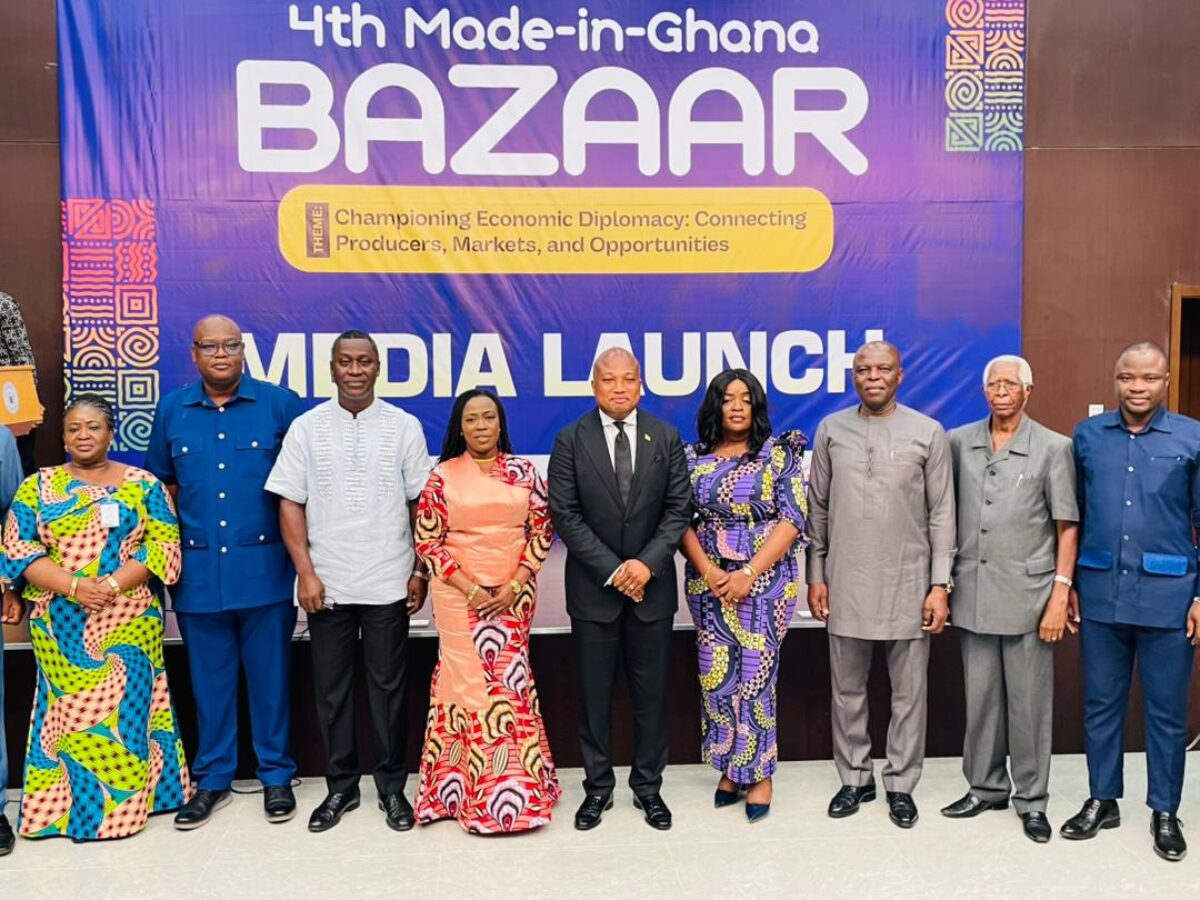By Makiza Micheline Latifa
The Ministry of Foreign Affairs and Regional Integration has officially launched the 4th edition of the Made-in-Ghana Bazaar, an initiative that continues to gain momentum as a key pillar of Ghana’s economic diplomacy strategy. This year’s event is scheduled to take place from 5th to 7th September 2025 at the Accra International Conference Centre, under the theme “Championing Economic Diplomacy: Connecting Producers, Markets and Opportunities.”
At the media launch held in Accra, stakeholders from across government, trade promotion institutions, and the private sector reaffirmed their commitment to positioning Ghanaian-made goods at the heart of national development and international trade. The event, which attracted wide participation, underscored the importance of using diplomacy not just for political dialogue but as a critical driver for economic growth.
In his keynote address, Minister for Foreign Affairs, Hon. Samuel Okudzeto Ablakwa, emphasized that the Bazaar forms part of a broader agenda to harness the strength of micro, small and medium enterprises (MSMEs) to build a self-reliant and globally competitive Ghana. He noted that the initiative aligns with the development vision of President John Dramani Mahama, who has long championed the growth of local industries as a pathway to sustainable national transformation.

The Minister announced a number of progressive policy measures aimed at reinforcing Ghana’s industrial and export base. Notably, all 71 Ghanaian diplomatic missions abroad will now be required to mark the country’s National Day on March 6 with exclusively Made-in-Ghana products and cuisine, thereby showcasing the richness and quality of local goods on a global stage. He further revealed that all humanitarian relief packages dispatched from Ghana will now consist solely of made-in-Ghana items, a bold move intended to stimulate local production and job creation. In addition, Made-in-Ghana companies will be prioritized in public procurement and contract awards, making domestic businesses central to government spending and infrastructure development.
Delivering remarks on behalf of the Ghana National Chamber of Commerce and Industry, First Vice President Emelia Assiakwa praised the Ministry’s leadership and described the Bazaar as an important platform to boost trade and create economic opportunities. She welcomed recent government interventions including the removal of nuisance taxes and the extension of the export trading window, noting that such measures are critical in creating a more enabling environment for local enterprises to thrive.
Her views were echoed by Tsonam Akpeloo of the Association of Ghana Industries, who emphasized the need to prioritize SMEs as the cornerstone of Ghana’s industrial growth. He urged the government to empower Ghana’s embassies to serve as trade facilitation hubs that can help local producers access markets across Africa and beyond. According to him, the future of Ghana’s industrial transformation depends on the ability of small and medium-scale enterprises to reach new buyers, scale operations, and compete globally, and this will require a robust network of support across diplomatic and trade institutions.
Alexander Dadawa, Director of Projects at the Ghana Export Promotion Authority (GEPA), described the Bazaar as a commendable example of institutional synergy, and lauded the Foreign Affairs Ministry for its unwavering commitment to fostering economic growth. He noted that the event offers a vital platform for Ghanaian producers to connect with buyers and international trade partners, and emphasized that the exposure provided by such platforms contributes directly to GEPA’s mission of expanding the country’s non-traditional export base.
Speaking on behalf of the Ghana Free Zones Authority, Mr. Hamidu Bamba described the upcoming Bazaar as a timely opportunity to demonstrate the depth of Ghana’s manufacturing and production capabilities. He encouraged local businesses, particularly those operating within free zones, to take advantage of the event to showcase their goods and attract investment. According to him, the Bazaar is not just about visibility but also about inspiring confidence in Ghana’s capacity to meet international demand.
Simon Madjie of the Ghana Investment Promotion Centre also delivered a message of support, noting that the Bazaar contributes meaningfully to Ghana’s broader strategy of positioning itself as a top-tier investment destination. He remarked that international investors are increasingly drawn to economies that can demonstrate domestic production strength and a proactive approach to private sector engagement, both of which the Bazaar highlights.
The 4th Made-in-Ghana Bazaar is expected to attract hundreds of exhibitors and thousands of participants including foreign dignitaries, investors, and trade experts. As Ghana continues to lean into economic diplomacy, this flagship event is shaping up to be a powerful symbol of national pride, industrial resilience, and international collaboration. From policy to practice, the Bazaar offers a clear pathway for turning Ghana’s local potential into global opportunity.


